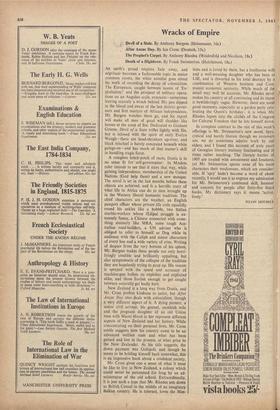Wracks of Empire
Devil of a State. By Anthony Burgess. (Heinemann, 16s.) After Anzac Day. By Ian Cross. (Deutsch,'15s.)
As earth's proud empires fade away, and negritude becomes a fashionable topic in senior common rooms, the white novelist goes about his work of recording the decay of colonialism. The Europeans, caught between taunts of 'Ex-' ploitation!' and the prospect of military opera- tions on an Angolan scale, evacuate—sometimes leaving scarcely a wrack behind. His pen dipped in the blood and sweat of the last district gover- nors and first martyrs of African independence, Mr. Burgess watches them go, and his report will make all men of good will shudder like horses at the scent of fire. Dedicated to Graham Greene, Devil of a State trifles lightly with Sin, but is infused with the spirit of early Evelyn Waugh—there are head-shrinkers up-river, and black mischief is barely concealed beneath white goings-on—and has much of that master's skill in handling tragic farce.
A complete hotch-potch of races, Dunia is in no sense fit for self-government: its Moslem ruler intends to see that it stays that way, while gaining independence, membership of the United Nations (God help them) and a new mosque. The novel is set in the last months before these objects are achieved, and is a horrific story of what life in Africa can do to men brought up in the Western liberal humanist tradition. The chief characters are the weather, an English passport officer whose private life coils squalidly round his ankles like a hobble, two Italian marble-workers whose CEdipal struggle is ex- tremely funny, a Chinese connected with some- thing sinisterly like MRA, some tough Aus- tralian road-builders, a UN adviser who is obliged to refer to himself as Dog while in audience with the Caliph and minor characters of every hue and a wide variety of cries. Writing of despair from the very bottom of his spleen, Mr. Burgess makes these people not only horri- fyingly credible and brilliantly appalling, but also symptomatic of the collapse of the tradition they are hopelessly trying to prop up. His venom is sprayed with the speed and accuracy of machine-gun bullets on exploiter and exploited alike, and those foolish enough to get caught between naturally get badly hurt.
New Zealand is a long way from Dunia, and Mr. Cross prefers kindness to satire, but After Anzac Day also deals with colonialism, though a very different aspect of it. A dying pioneer, a senior civil servant, his genteel, snobbish wife and the pregnant daughter of an old Union man with Maori blood in her represent different aspects of New Zealand and her history. While concentrating on their personal lives, Mr. Cross subtly suggests how his country came to be an advanced welfare state and what has been gained and lost in the process, at what price to the New Zealander. As his title suggests, the down payment was Gallipoli, and though he seems to be holding himself back somewhat, this is an impressive book about a confident society.
Mr. Cross gives one a sense of what it must be like to live in New Zealand, a colony which could never be patronised for long by an ad- ministrator of the old school. Extraordinarily, it is just such a type that Mr. Rhodes sets down as British Consul in the middle of an imaginary Balkan country. He is tolerant, loves the Mos- lems and is loved by them, has a loathsome wife and a well-meaning daughter who has been to LSE, and is thwarted in his total decency by a combination of Western business and Com- munist economic necessity. While much of the detail may well be accurate, Mr. Rhodes never makes his country at all convincing and its status is bewilderingly vague. However, there are some good moments, especially at a garden party cele- brating the Queen's birthday: it is when Mr. Rhodes lapses into the clichés of the Congress for Cultural Freedom that he lets himself down.
In complete contrast to the rest of this week's offerings is Mr. SWinnerton's new novel. Spry, cynical and barely literate though we reviewers are, we do sometimes admire work by our elders, and I found this account of sixty years of Georgian literary jealousy fascinating and at times rather touching. The literary battles of 1905 are treated with amusement and fondness, yet Mr. Swinnerton spares none of his main characters their weaknesses, which are consider- able. If 'spry' hadn't become a word of abuse recently, I would use it to express my admiration for Mr. Swinnerton's continued skill, humour and concern for people after forty-five listed hooks. My dictionary says it means 'active, lively.'
JULIAN MITCHELL














































 Previous page
Previous page